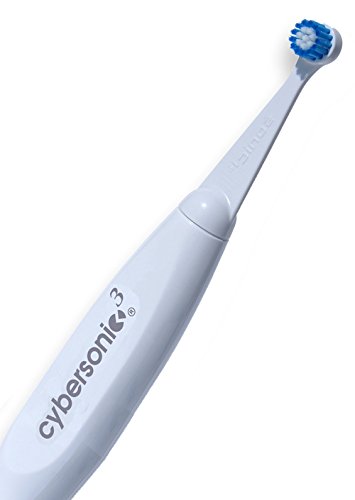Find out how a mini dental implant
can be used where normal
dental implants are too big
A mini dental implant is smaller than a conventional full-sized dental implant. Not just slightly smaller, but A LOT smaller! They really DO deserve their name "mini dental implants".
This smaller size is really their main advantage. They need much less space than a normal implant, because they are shorter and also thinner. This means they can go into places that a conventional dental implant would be too big for.
For example, a single-tooth gap that is only 5-6mm wide, with only 8mm vertical depth of bone. This is MUCH TOO SMALL for a normal implant! A conventional dental implant usually needs AT LEAST 7mm of a gap, and more than 10mm of vertical depth IN SOLID BONE.
If the gap width is LESS than 7mm, then the implant may be VERY CLOSE to the roots of the adjacent teeth - and possibly cause damage to the roots, leading to LOSING THE ADJACENT TEETH down the road.
SO, mini dental implants are GREAT for those tooth gaps that are a little too small for conventional dental implants.
In these situations, they can be used as an alternative option to conventional implants. Mini implants are approximately the shape and size of a wooden toothpick, but they are only about 10mm to 15mm long, less than an inch. As far as I am aware, all mini implants are made of titanium, like normal implants.
There are specific advantages and disadvantages with mini implants. Let's take a look at the advantages first!
They are less expensive for the dentist to buy.
They are quicker and easier for the dentist to put in, which means less surgery time is involved. This results in quicker healing, and lower costs overall. If the dentist needs LESS TIME, then it means LESS EXPENSE.
Because mini implants are so small, they are also narrow enough to fit into spaces between teeth where normal implants would be too big.
They can also be quite short when compared to most normal implants.
But What about the disadvantages?
Mini Dental Implant - disadvantages.
- Because mini implants are small, they cannot take the weight or stress that normal implants can. This means they cannot be used for supporting a big fixed bridge, for example.
- They do not become fused to the jawbone as firmly as conventional dental implants. This means that they tend to have a higher failure rate over time.
So what good are they?
Mini implants are so small that they don't need much room at all. They are also shorter than normal implants as well as being thinner.
Being shorter is very useful if your jawbone has shrunk down a lot, leaving you with a full lower denture that is loose. In this situation, normal dental implants are simply too long. If a dentist tried to fit a normal sized implant into a very small lower jaw, there would be a danger of the implant coming through the bottom of the jaw!
 3M mini dental implant
3M mini dental implantBut mini dental implants need much less room, and can be used safely in shrunken jaws, providing accurate measurements have been made.
When should your dentist consider recommending mini dental implants?
The ideal situation to think about mini implants is when you have a full lower denture which is loose, and despite getting a new denture made, it's STILL loose because your lower jaw is now too small to support a denture properly.
In this situation, your jaw is also likely to be too small for normal implants.
Mini implants can be used to hold your loose lower denture in place. Usually 5 or 6 implants are needed, but most dentists would advise you to expect 1 or 2 to become loose with time and require removal. The others should remain in place and continue to work normally, holding your denture securely in place.
Mini Dental Implant
And at a fraction of the price of full-sized implants, they are certainly worth asking your dentist about.
When should mini dental implants NOT be used?
There are always exceptions to every rule, but in general mini implants don't work so well in the upper jaw, because the bone there is not dense enough.
Usually.
The bone of your lower jaw is normally denser, and can "grip" a smaller implant better than the bone in your upper jaw.
Also, although a single mini implant can successfully support a single crown (or "cap") if there is enough room to use a relatively long implant, they are generally not robust enough to support fixed bridgework.
So, the MAIN advantages of mini dental implants are their small width and relatively low cost. There ARE some normal implants that are quite short (ie. 6mm), but they are usually fatter than normal to help compensate. Mini implants are narrow AND relatively short.
They can be very successful if used correctly AND in the right situation.
As always, an important factor in successful dental implant treatment is keeping the implants free of dental plaque build-up. One of the best ways of doing that is with a good toothbrush, and good brushing technique - ie. brushing for 5 to 6 minutes!. I usually recommend the Cybersonic3 Sonic toothbrush.
Remember to check out my top recommended electric toothbrush, which has the best performance and a great price at Amazon - the Cybersonic 3 brush.




